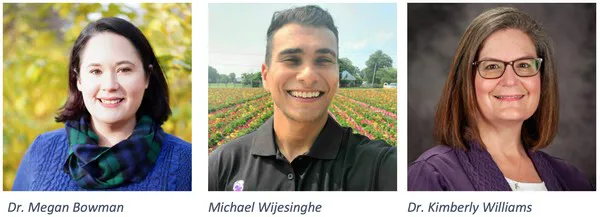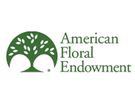This fall, the American Floral Endowment created two informal surveys for academia and professionals in the industry about their experiences and advice to help young professionals interested in pursuing a career in floriculture/horticulture. The surveys include insights on the job market, career development, application advice, background on how professionals attained their current roles, and more. The surveys were released to AFE’s community of faculty, donors, and industry members.
With the help of the Young Professionals Council (YPC) through member Michael Wijesinghe, AFE analyzed the data and compiled the results into two executive summaries, one for the Industry Survey and one for the Academic Survey. To share the results and answer any questions, the YPC sponsored a webinar on November 16th, 2021, which you can watch here.

The webinar featured the following speakers: Dr. Megan Bowman is currently Director of Research Operations for the Ball Helix research and development team at Ball Horticultural Company. She also serves on AFE’s Board of Trustees and is the Board Liaison for the YPC. Michael Wijesinghe is an Assistant Grower for Bell Nursery in Springfield, Ohio. He became a member of the YPC in 2021. Dr. Kimberly Williams is a Professor in Greenhouse Management and University Distinguished Teaching Scholar at Kansas State University. She also serves as a member of the Vic and Margaret Ball Internship selection committee and AFE scholarship reviewer.
Application do's and don’ts
When asked about common mistakes on applications both in industry and academia, Dr. Bowman responded: “We often see that, sometimes, people will assume that their networks alone will get them the job they want. Applicants will have gone to great universities, worked with fantastic professors and floriculture labs, and while that’s important, it’s only so much. What matters is what you’re going to take from your education and bring to a team of people that you’re going to start working with and offer your skillset to. It’s important to show the value you bring beyond your network.”
From the survey data, the panel also discussed the importance of having a 'clean application' with correct spelling and grammar; this can often be the difference between an application making it to the next round or being dismissed.
Dr. Williams expanded into best practices for applications sharing: “As was mentioned in the survey, apply for jobs that really are what you love and what you want to do. If you are a researcher, don’t apply for an 80% teaching position and vice versa. Along those lines, look at the position you’re applying for, address all aspects of the position that they’re looking for, and tailor comments of your own experience to pull out highlights that will resonate with the search committee by meeting key functions of the role.”
Both surveys showed the importance of a variety of experiences for those applying to jobs in floriculture. Sharing his own experience as a young professional in the industry, Wijesinghe added how internships can provide an opportunity for young professionals to interview their company as well as the company interviewing them.
Finding a fair salary and negotiations
Young professionals wanted to hear from the panel how and where to do salary research to make sure their pay is competitive. They also asked how to properly negotiate once they receive a job offer.
Dr. Bowman answered: “A lot about a salary really depends on the cost of living. You have to consider that a job outside of a metro area will probably have a lower salary because the cost of living is lower compared to living somewhere as expensive as California, for example. The money you put towards providing a life you want to live in different places may look very different – you have to factor that in.” She added that some good sources for salary data are Glassdoor and LinkedIn. Dr. Bowman stressed the importance of doing your research on benefits and salary before going into an interview.
When to apply before graduation
When looking for roles and industry and academia, students would like to know when they should apply with regards to their graduation dates. “Within academia, it’s not uncommon to start searching for jobs the semester before graduating because the timeline is so long between interviewing, getting the offer, and starting,” noted Dr. Williams.
“In industry, if employers are looking for someone out of grad school, it’s really helpful to know when your defense is. That’s one of the biggest things that we ask. If you can’t tell us, then it’s not a full stop, but it is a risk. Once you know when your defense is, that’s probably the earliest you should be applying,” answered Dr. Bowman.
Diversity of roles in floriculture/horticulture
Survey data for both academia and industry emphasize the diversity of roles and encourage young professionals to be ready to wear multiple hats. During the discussion, the audience wanted to know how best to juggle and balance multiple priorities.
Dr. Bowman noted the importance of knowing your team and sharing support: “Balancing a role can be challenging, and a lot of times, success is partly dependent on who your direct supervisor is and the team that you work with. In interviewing for a role, that matters a lot when you’ll be balancing priorities.” In her expanded response during the webinar, she also shares tips on being your own advocate and matching your personal goals to the company’s goals.
Dr. Williams shared: “I think it’s a struggle we all certainly face. There’s always the imminent fires you have to put out, so I think some of the art comes into play when you figure out how to do the stuff that’s not urgent but needs to get done to be successful.” She also stressed the importance of being true to yourself and your passions, noting that balancing priorities is easier when you are doing things that you love.
Networking
Networking is an important tool when finding career opportunities. AFE has helped young professionals to meet professionals in our industry through the YPC and other resources. The YPC has opportunities to meet up at hosted dinners and lunches at industry events throughout the year. This year, the group met both at Cultivate and ASHS.
“I thought the survey results on networking were on the mark. Every presentation that you give is going to be an opportunity to network with someone who may work in a department with a position open who becomes a really important connection in the future,” reflected Dr. Williams.
Wijesinghe added that networking is especially important due to how connected all the segments of the industry are: “One of the great things about floriculture and horticulture is the existence of extension and how much overlap there is between breeders, researchers, gardeners, farmers, and everything in-between. It’s really important to build those connections, and what’s nice is that a lot of them are fluid.” The panelists expanded on collaboration opportunities and setting yourself up for success in networking.
If you want to watch the recording of the webinar, you can do so here.

